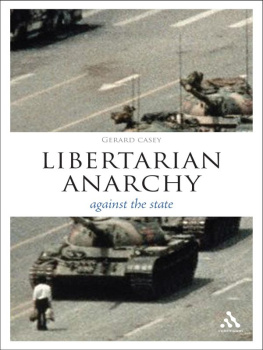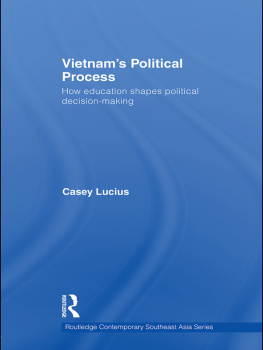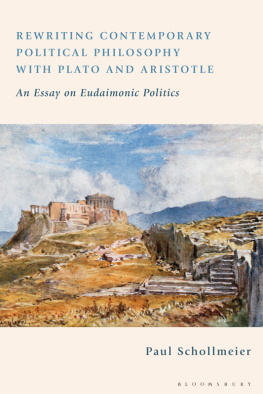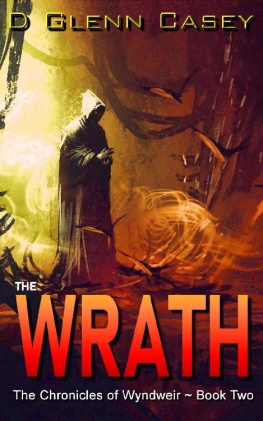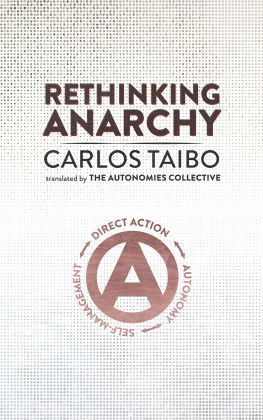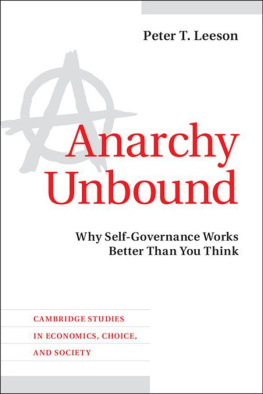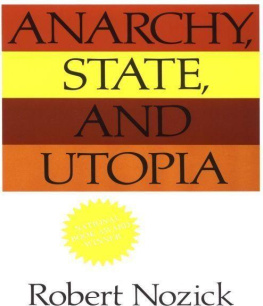LIBERTARIAN
ANARCHY
THINK NOW
Think Now is a new series of books which examines central contemporary social and political issues from a philosophical perspective. These books aim to be accessible, rather than overly technical, bringing philosophical rigour to modern questions which matter the most to us. Provocative yet engaging, the authors take a stand on political and cultural themes of interest to any intelligent reader.
AVAILABLE NOW:
Beyond Animal Rights, Tony Milligan
Ethics of Climate Change, James Garvey
Ethics of Metropolitan Growth, Robert Kirkman
Ethics of Trade and Aid, Christopher D. Wraight
Historical Redress, Richard Vernon
Just Warriors Inc., Deane-Peter Baker
Nanoethics, Donal P. OMathuna
Personal Responsibility, Alexander Brown
Terrorism, Nicholas Fotion
War and Ethics, Nicholas Fotion
SERIES EDITORS:
James Garvey is Secretary of the Royal Institute of Philosophy, UK. He is the author of The Twenty Greatest Philosophy Books and The Ethics of Climate Change, also published by Continuum.
JeremyStangroom is co-editor, with Julian Baggini, of The Philosophers Magazine and co-author of Why Truth Matters, What Philosophers Think and Great Thinkers A-Z (all Continuum).
LIBERTARIAN
ANARCHY
Against the state
GERARD CASEY

Continuum International Publishing Group
The Tower Building 11 York Road 80 London SE1 7NX
Maiden Lane Suite 704 New York NY 10038
www.continuumbooks.com
Gerard Casey, 2012
All rights reserved. No part of this publication may be reproduced or transmitted in any form or by any means, electronic or mechanical, including photocopying, recording, or any information storage or retrieval system, without prior permission in writing from the publishers.
The Author has asserted his right under the Copyright, Designs and Patents Act, 1988, to be identified as Author of this work.
British Library Cataloguing-in-Publication Data
A catalogue record for this book is available from the British Library.
ISBN: 978-1-4411-0338-3
Library of Congress Cataloging-in-Publication Data
Casey, Gerard, 1951
Libertarian anarchy : against the state / Gerard Casey.
pages cm. (Think now)
Includes bibliographical references and index.
ISBN 978-1-4411-4467-6 (pbk. : alk. paper) ISBN 978-1-4411-2552-1 (hardcover : alk. paper) ISBN 978-1-4411-0338-3 (ebook epub : alk. paper) ISBN 978-1-4411-4961-9 (ebook pdf : alk. paper)
1. AnarchismPhilosophy. 2. State, ThePhilosophy. I. Title.
HX833.C37 2012
335.83dc23
2011048717
CONTENTS
ACKNOWLEDGEMENTS
I have to thank my long-suffering colleagues in University College Dublin for listening to me rabbiting on about libertarianism and anarchism ad nauseam and for being far too polite to tell me Im talking through my hat. I am particularly grateful to my academic next-door neighbour Brian OConnor for strolling into my room from time to time and asking questions beginning with, What would libertarians say about...? The support of my former mentor in philosophy, Garrett Barden, is much appreciated. His conversation is always delightfully lucid, precise, elegant and insightful. Thanks are due to my students, postgraduate and undergraduate, who made (and make) the teaching of this material to them a positive pleasure. They have been in turn bewildered, incredulous, outraged, enthusiastic, but always argumentative and engaged.
I am very grateful to the Ludwig von Mises Institute for regularly allowing me to present my ideas at the annual Austrian Scholars Conference (ASC) convened by Dr Joseph Salerno. In a world where academic conferences routinely resemble a set of intellectual penitential exercises the ASC provides unmatched intellectual stimulation while also being possibly the only place on earth where I can be made to feel insufficiently radical.
I have been thinking about these matters for some years now and some of my thoughts have been published in different forms in various outlets. I have reused some of this material, integrating it into the larger narrative, and I am grateful to the publications involved for permission to republish. Particulars are noted where appropriate.
I make no claims to novelty for anything I have said but console myself with the thought expressed by one of my heroes, St Thomas More, that an absolutely new idea is one of the rarest things known to man. Rather than strive for novelty, I have attempted, perhaps unfashionably, to say what I think is true. I could, of course, be wrong since attempt, alas, isnt necessarily the same thing as achievement.
Everything that I have read in preparation for writing this book (at least in the last year or so) is listed in the Bibliography and I cannot sufficiently express my gratitude to those who wrote this material, both those whom I consider to have illuminated the issues in ways I find congenial and those whom I consider to have proposed really tough and interesting alternatives to my position. If I have misquoted anyone or, even worse, failed to credit someones words or ideas, I apologise and will do my best to rectify matters as and when appropriate.
I very much appreciate the help of Patricia Casey, Jason Walsh and Peter White in reading and commenting on the manuscript. Apart from picking up numerous typographical errors, they also forced me to make this book something written in a language that has some connection with idiomatic English rather than being expressed in that strange and incomprehensible academic dialect I have learnt over too many years in what some wit once called the graves of academe.
INTRODUCTION
The criminal state
States are criminal organizations. All states, not just the obviously totalitarian or repressive ones. The only possible exceptions to this sweeping claim are those mini-states that are, in effect, swollen bits of private property, such as the Vatican. I intend this statement to be understood literally and not as some form of rhetorical exaggeration. The argument is simple. Theft, robbery, kidnapping and murder are all crimes. Those who engage in such activities, whether on their own behalf or on behalf of others are, by definition, criminals. In taxing the people of a country, the state engages in an activity that is morally equivalent to theft or robbery; in putting some people in prison, especially those who are convicted of so-called victimless crimes or when it drafts people into the armed services, the state is guilty of kidnapping or false imprisonment; in engaging in wars that are other than purely defensive or, even if defensive, when the means of defence employed are disproportionate and indiscriminate, the state is guilty of manslaughter or murder.
For many people, perhaps most, these contentions will seem both shocking and absurd. Some will immediately object that taxation is clearly not theft. They may say as Craig Duncan does that since you do not have legal title to all your pre-tax income the state commits no crime in appropriating that part of your income to which it is entitled. The problem with this objection is that it completely begs the question

